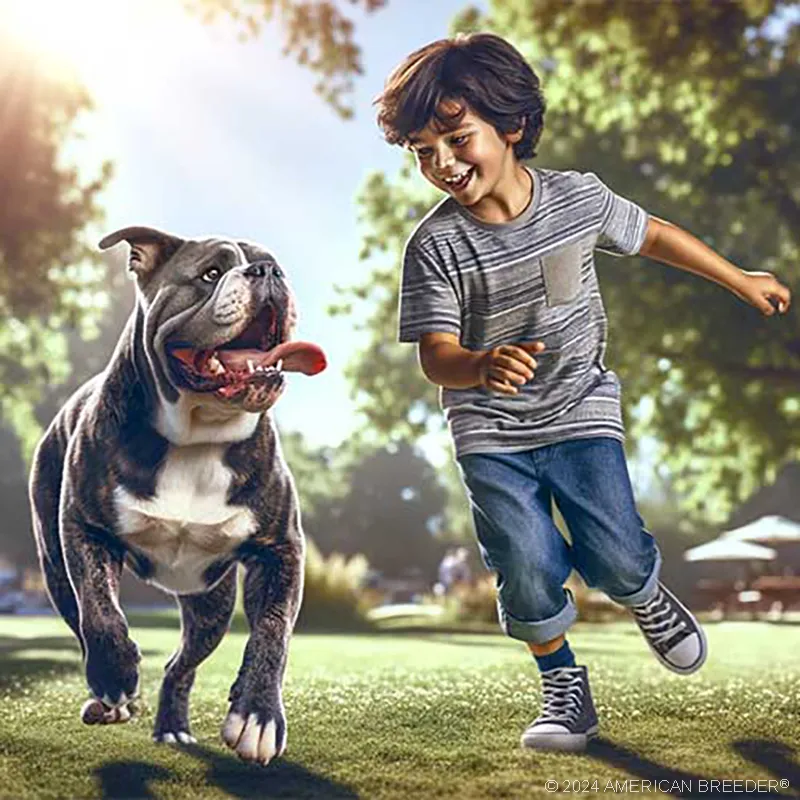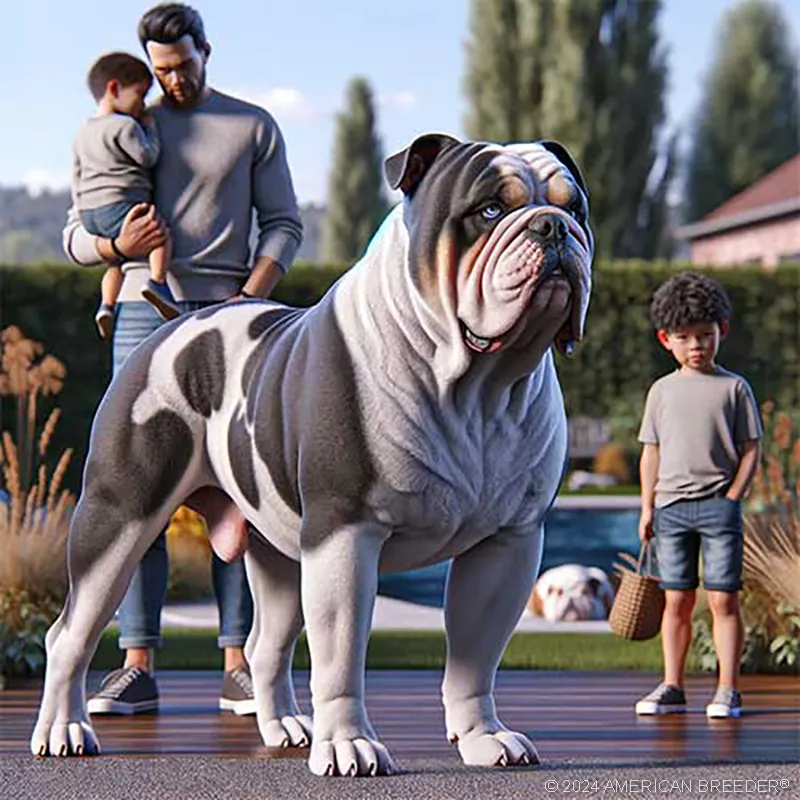Georgia's Guardian: The Magnificent Alapaha Blue Blood Bulldog
The Origins and Rich Legacy of the Alapaha Blue Blood Bulldog
 Nestled in the heart of Southern plantations, amidst expansive cotton fields, unfolds the rich tapestry of the Alapaha Blue Blood Bulldog’s lineage. It was here, in the 1800s, where their ancestors, the Old Country Bulldog, stood as stalwart protectors and adept cattle herders. These early guardians were the bedrock of today’s Alapaha, appointed with the sacred duty of safeguarding homes and lands.
Nestled in the heart of Southern plantations, amidst expansive cotton fields, unfolds the rich tapestry of the Alapaha Blue Blood Bulldog’s lineage. It was here, in the 1800s, where their ancestors, the Old Country Bulldog, stood as stalwart protectors and adept cattle herders. These early guardians were the bedrock of today’s Alapaha, appointed with the sacred duty of safeguarding homes and lands.
Lana Lou Lane, a beacon of hope, rekindled the diminishing flame of the breed. Through strategic breeding, she not only salvaged them from the precipice of extinction but also accentuated their distinct traits. But the Alapaha's saga is more than mere chronology; it's interwoven with tales of steadfast loyalty, unmatched courage, and resilience. Their journey, from the sprawling fields of the South to the hearts of families worldwide, resonates with the harmonious symphony of heritage and evolution.
The Artistry of Their Physical Form
A sight to behold, the Alapaha Blue Blood Bulldog is a masterful blend of power and aesthetics. Their robust physique, adorned with a coat that can dance between shades of blue merle to deep chocolate, evokes both admiration and awe. Beneath the broad dome of their head lie expressive eyes, varying from earthy browns to ethereal blues, each gaze echoing tales of their storied past.
In terms of stature, males typically stand taller, their heights ranging between 20 to 24 inches and a weight bracket of 70 to 90 pounds. The females, while slightly more petite, mirror the males in their athletic prowess. Their short coat is not merely a visual delight; it stands as a sentinel against the vagaries of nature, safeguarding them from environmental adversaries.
A Dive Into Their Enigmatic Temperament
Behind the mesmerizing façade of the Alapaha Blue Blood Bulldog lies a temperament replete with contrasts. One moment, they're the epitome of playfulness, indulging in joyful antics with their human companions, and in another, they seamlessly transition into the role of vigilant protectors, their every sinew alert to potential threats. The depth of their loyalty, passed down through the annals of time, remains legendary.
Yet, intelligence shines equally brightly in their character matrix. Their analytical acumen is often at play, gauging scenarios and responding with aptness. However, such intellect is paired with a zest for independence. It is here that the importance of early training and exposure to diverse social stimuli becomes paramount, shaping them into well-rounded, balanced adults.
The Science and Art of Their Care
Marrying the wisdom of veterinary science with the nuances of breed-specific needs, caring for an Alapaha Blue Blood Bulldog transforms into both an art and a science. Their energetic nature demands regular outlets, be it structured play or leisurely strolls. Tailored dietary regimens, abundant in proteins and essential nutrients, ensure they remain at the zenith of health.
 But beyond physical well-being lies the realm of grooming. Their coat, while relatively low-maintenance, benefits from regular care, preserving its luster and vitality. Furthermore, proactive medical care, encompassing timely check-ups, vaccinations, and preventive measures, are indispensable pillars supporting their long, fulfilling life.
But beyond physical well-being lies the realm of grooming. Their coat, while relatively low-maintenance, benefits from regular care, preserving its luster and vitality. Furthermore, proactive medical care, encompassing timely check-ups, vaccinations, and preventive measures, are indispensable pillars supporting their long, fulfilling life.
The Pedagogy of Training the Alapaha
Stepping into the realm of training, the Alapaha Blue Blood Bulldog emerges as a keen learner. Their inherent intelligence dovetails with a desire to please, making them receptive students. Yet, the brushstrokes of independence in their character canvas necessitate consistency and positive reinforcement in training approaches.
It's in their formative years that the seeds of balanced social behavior need sowing. Early socialization, enveloping a gamut of experiences, humans, and fellow animals, paves the way for well-adjusted adulthood. Given their protective instincts, calibrated introductions and experiences ensure they navigate the mosaic of social dynamics gracefully.
Navigating Their Health Landscape
While robust by nature, the Alapaha Blue Blood Bulldog isn't impervious to health nuances. Breed-specific concerns, ranging from hip dysplasia to entropion, necessitate vigilance. Yet, with proactive care, regular health evaluations, and an ongoing dialogue with a seasoned veterinarian, most potential challenges can be navigated seamlessly.
Their genetic blueprint, an intricate map detailing their lineage and health propensities, offers invaluable insights. By staying attuned to these markers and merging them with current health best practices, one can craft a health regimen that stands as a bulwark against potential ailments.
The Alapaha in Contemporary Canine Discourse
Time, while changing landscapes, has only added layers to the Alapaha's significance. From their historical roles as guardians and herders, they've transitioned into roles as cherished family members, therapy dogs, and even show
The Alapaha's Harmonious Coexistence
In the tapestry of human-canine relationships, the Alapaha Blue Blood Bulldog's threads shimmer distinctively. Their deep-rooted protective instincts make them unparalleled guardians of their human families. However, this trait is delicately balanced with a profound sense of loyalty and affection. Their compatibility with children and other pets is often a testament to their well-rounded temperament, especially when they are socialized early and correctly.
While they often exhibit a calm demeanor, their energy and playfulness come to the fore in open spaces, where they can frolic and engage in activities. Their interactions in multi-dog households, given their pack-oriented nature, usually revolve around established hierarchies. Hence, integrating them requires patience, structured introductions, and an understanding of canine social dynamics.
Adapting to Their Living Needs
Every breed carries its set of preferences, and the Alapaha is no different. While they can adapt to apartment living, they thrive best when there's an expanse for them to stretch, play, and patrol. A house with a fenced yard stands as an ideal haven for them, providing them with the freedom they cherish while ensuring their protective instincts don’t lead them astray.
Climate considerations, given their coat and physical constitution, also play a crucial role. While they handle moderate climates with grace, extreme temperature fluctuations call for human intervention, ensuring their comfort and health remain uncompromised.
Culinary Adventures and Nutritional Necessities
An Alapaha's diet is an intricate dance between nutritional science and the breed's specific needs. High-quality commercial or raw diets rich in protein, balanced with essential fats, vitamins, and minerals, are their nutritional cornerstones. However, their dietary regimen isn't static. Age, activity level, health considerations, and even individual preferences often dictate periodic modifications.
 Yet, while nourishing them, one must also remain vigilant against overfeeding. Their athletic build and energetic nature demand a careful balance of calories to prevent obesity and associated health concerns. Periodic consultations with a veterinarian or canine nutritionist can illuminate the optimal dietary pathway for each individual Alapaha.
Yet, while nourishing them, one must also remain vigilant against overfeeding. Their athletic build and energetic nature demand a careful balance of calories to prevent obesity and associated health concerns. Periodic consultations with a veterinarian or canine nutritionist can illuminate the optimal dietary pathway for each individual Alapaha.
Ensuring Their Glistening Coat and Overall Grooming
The Alapaha's coat, a visual delight, is also a mirror reflecting their health and well-being. Regular brushing, usually once a week, not only maintains its sheen but also strengthens the human-dog bond. Beyond the coat, their grooming regimen encompasses nail trimming, ear cleaning, and periodic dental care.
Being a breed with a relatively short coat, they are less prone to shedding. However, during seasonal changes, increased shedding can occur. Regular grooming sessions not only help in managing the shedding but also provide an opportunity to check for any skin issues, ticks, or abnormalities.
The Essence of The Alapaha
As our journey into the heart of the Alapaha Blue Blood Bulldog concludes, it's evident that they are more than just a breed. They are legacies of a rich history, guardians of homes, cherished companions, and above all, embodiments of loyalty and courage. Owning an Alapaha is not just about having a pet; it's about embracing a member with a lineage as rich as time itself.
In understanding them, one transcends mere knowledge. It's about resonating with their spirit, understanding their quirks, celebrating their joys, and standing by them through challenges. For in the heart of each Alapaha beats a story, a legacy, and a promise of unwavering loyalty.
The Alapaha’s Health Landscape
The Alapaha Blue Blood Bulldog, like all breeds, comes with its own set of health intricacies. Knowledgeable guardians are equipped to provide not just a loving home, but a sanctuary where health and happiness intertwine. Common health issues such as hip dysplasia, entropion, and deafness can occasionally make appearances in their lineage. Hence, periodic health checks and an ongoing dialogue with veterinarians who are familiar with the breed can significantly enhance their quality of life.
The Alapaha’s muscular frame and robust constitution also make them susceptible to certain joint issues. Supplements like glucosamine and chondroitin can be valuable allies in preserving their joint health. A proactive approach, marrying both preventive measures and prompt medical interventions, ensures that our beloved Alapahas navigate their health journey with grace and vitality.
Training the Alapaha: A Symphony of Respect and Understanding
Training is not just about commands; it's about communication. With the Alapaha, it’s crucial to remember that this breed's intelligence and protective instincts call for a balanced approach. Their keen mind demands stimulation, which can be provided through obedience training, agility courses, and even puzzle toys.
 However, one must always approach an Alapaha with respect. Their loyalty is won, not demanded. Positive reinforcement techniques work wonders, emphasizing rewards over reprimands. Given their protective nature, early socialization is paramount, introducing them to varied experiences, environments, and beings, forging a well-rounded temperament. For those diving into the world of Alapaha training, seeking guidance from breed-specific trainers can be an enlightening experience.
However, one must always approach an Alapaha with respect. Their loyalty is won, not demanded. Positive reinforcement techniques work wonders, emphasizing rewards over reprimands. Given their protective nature, early socialization is paramount, introducing them to varied experiences, environments, and beings, forging a well-rounded temperament. For those diving into the world of Alapaha training, seeking guidance from breed-specific trainers can be an enlightening experience.
The Alapaha and the World: Socialization Nuances
The Alapaha, with its guardian lineage, approaches the world with a discerning eye. Early socialization, therefore, becomes pivotal. Introducing them to different sounds, sights, and experiences when they're puppies can sculpt their adult personalities, ensuring they distinguish between genuine threats and benign encounters.
However, it’s not just about exposure; it’s about positive associations. Ensuring each new experience is paired with rewards and positive reinforcement can help an Alapaha see the world as an exciting canvas rather than a series of threats. Their interactions with other animals, especially dogs, should be monitored and guided, ensuring they establish healthy social hierarchies and relationships.
Responsible Ownership and Beyond
Owning an Alapaha Blue Blood Bulldog is a privilege and a responsibility. Being responsible doesn’t just mean regular vet visits or quality food; it means understanding the breed's history, temperament, needs, and quirks. It's about being an advocate for the breed, educating others, and dispelling myths.
Furthermore, as responsible stewards of this majestic breed, owners are also custodians of their legacy. Ensuring ethical breeding practices, opposing puppy mills, and championing adoption can ensure the breed's welfare in the larger canvas of canine well-being. Engaging in breed-specific communities, clubs, and organizations can not only provide invaluable insights but also foster a collective commitment to the Alapaha's bright and thriving future.
Nutritional Needs and Considerations
Food is not just sustenance; for the Alapaha Blue Blood Bulldog, it’s a crucial pillar of health. This breed, with its sturdy build and energetic disposition, has specific dietary needs that guardians must be attuned to. Protein, the bedrock of muscle health, should be abundant in their diet, preferably from high-quality animal sources. Moreover, given their active nature, they require a balanced proportion of fats to fuel their daily escapades.
However, not all foods are created equal. Some Alapahas may exhibit sensitivities to certain ingredients, which underscores the importance of a carefully chosen diet. Ingredients such as fillers, artificial additives, or sub-par meat byproducts might not sit well with them. Regular consultations with veterinarians can help tailor a diet that’s both nutritious and compatible with their digestive system.
Hydration, too, is of paramount importance. Ensuring they have access to fresh water, especially after bouts of activity, keeps them hydrated and aids in digestion. Lastly, given their propensity for certain hereditary health issues, specialized diets or supplements can be considered, always under the guidance of a trusted veterinarian.
Grooming the Majestic Alapaha
The Alapaha's coat, a canvas of colors and patterns, is more than just an aesthetic marvel; it’s a testament to their lineage and heritage. Regular grooming not only keeps them looking their best but also promotes skin health. Their short coat is relatively low maintenance but benefits immensely from periodic brushing. This not only removes loose fur but also stimulates skin oils, giving their coat a healthy sheen.
 Beyond the coat, grooming encapsulates a holistic regime. Regular ear checks can prevent infections, while nail trimming ensures their paws remain in top condition. Dental health, often overlooked, is equally critical. Regular brushing coupled with dental chews can keep periodontal issues at bay.
Beyond the coat, grooming encapsulates a holistic regime. Regular ear checks can prevent infections, while nail trimming ensures their paws remain in top condition. Dental health, often overlooked, is equally critical. Regular brushing coupled with dental chews can keep periodontal issues at bay.
The Alapaha’s Playful Spirit
Play is not just a pastime; for the Alapaha, it's a window to their soul. This breed, with its rich history of guardianship, melds moments of sheer joy with bouts of protective instincts during play. Their toys should cater to their robust nature—durable, challenging, and interactive.
Their intelligence shines through in their play. Puzzle toys, agility courses, and interactive games can keep their mind engaged, providing the dual benefits of mental stimulation and physical exercise. Given their protective instincts, play also becomes an opportunity for training, especially in distinguishing between toys and potential threats.
However, it’s not just about the toys. Play is also about bonding. Engaging with them, understanding their play cues, and respecting their boundaries can deepen the bond between the Alapaha and their human counterparts. Through play, one doesn’t just entertain an Alapaha; one converses, connects, and cherishes moments of shared joy.
Training and Behavioral Insights
The Alapaha Blue Blood Bulldog, with its rich lineage and history, has not just a robust physique but a sharp intellect. Training this breed is both a privilege and a responsibility. The breed's keen intelligence makes it receptive to training, but their inherent protective instincts necessitate an understanding, consistent, and firm hand.
Start early. Puppyhood is a formative phase where foundational behaviors are ingrained. Positive reinforcement, using treats or praise, proves effective. While they are eager to please, they also have a streak of independence. Patience is essential. It’s also pivotal to understand that training is not just about commands; it's about communication. Building a bond of trust is the cornerstone of effective training.
Socialization is another significant facet. Given their protective nature, exposing them to various environments, sounds, and people during their early months can ensure they grow up to be well-rounded and sociable adults. Moreover, addressing any signs of aggression or territorial behavior promptly and effectively is key to preventing potential challenges in the future.
Social Dynamics and Compatibility
The Alapaha's protective streak isn't just a trait; it's an emblem of their enduring loyalty. They are naturally wary of strangers, which makes them excellent watchdogs. However, with family, their demeanor undergoes a profound transformation. They're gentle, loving, and especially patient with children, often forming deep bonds that last a lifetime.
 But like every breed, they have their quirks. Their dominant nature can sometimes make them a handful around other pets, especially of the same sex. Early socialization is pivotal in ensuring they coexist harmoniously with other household animals. Understanding canine body language can provide invaluable insights into their social dynamics, helping prevent conflicts before they escalate.
But like every breed, they have their quirks. Their dominant nature can sometimes make them a handful around other pets, especially of the same sex. Early socialization is pivotal in ensuring they coexist harmoniously with other household animals. Understanding canine body language can provide invaluable insights into their social dynamics, helping prevent conflicts before they escalate.
When it comes to adapting to different living environments, the Alapaha is surprisingly versatile. They’re just as comfortable in an apartment as they are in a house with a yard, provided they get their daily dose of exercise. However, a secure environment is crucial given their protective instincts.
Health and Wellness
Ensuring the well-being of an Alapaha extends beyond just diet and exercise; it’s a holistic endeavor. Regular veterinary check-ups can preemptively address potential health concerns. The breed, while robust, is predisposed to certain genetic ailments. Regular screenings for common issues like hip dysplasia, entropion, or deafness can ensure timely interventions.
Furthermore, preventive care, like vaccinations, flea and tick treatments, and heartworm preventatives, safeguard them from common canine ailments. A keen eye on any behavioral changes can also be indicative of underlying health concerns. Regular play and interaction can thus serve dual purposes - fostering a bond and ensuring their well-being.
Lastly, mental health is as crucial as physical health. Ensuring they have a stimulating environment, filled with toys, interaction, and challenges, can keep them mentally agile and content. After all, a happy Alapaha is not just a healthy one; it's a joyous, spirited companion that enriches lives with its boundless energy and unwavering loyalty.
Nutrition and Dietary Needs
For a breed as vivacious and hardy as the Alapaha Blue Blood Bulldog, nutrition plays a pivotal role in ensuring they live their best life. Their muscular build and high energy levels necessitate a diet that fuels both their physical and cognitive functions. It’s not just about the quantity but the quality of the food they consume.
A balanced diet for an Alapaha should encompass proteins, fats, vitamins, and minerals. High-quality commercial dog foods often cater to these needs. However, it's important to choose a brand and formula tailored for their specific life stage—puppy, adult, or senior. Additionally, while many owners are tempted to delve into homemade diets, consulting with a veterinary nutritionist is essential to ensure all their dietary requirements are met.
Just as important as what they eat is how they eat. Monitoring their eating habits can provide essential insights into their overall health. Sudden changes in appetite or unusual behaviors during mealtime might be indicative of underlying health or dental issues. Equally crucial is ensuring they have access to fresh water at all times, especially during the hotter months.
Grooming and Maintenance
The Alapaha's coat, a reflection of their elegance, is relatively low maintenance. However, regular grooming ensures they not only look their best but feel their best. Their short coat benefits from weekly brushing, which helps in removing loose hair, stimulating skin oils, and distributing those oils for a shiny, healthy coat.
 Bathing them too frequently can strip their coat of essential oils, making them susceptible to skin issues. Instead, occasional baths, particularly when they're visibly dirty or emit an odor, suffice. It's essential to use a dog-specific shampoo, ensuring it's thoroughly rinsed out to prevent any residue.
Bathing them too frequently can strip their coat of essential oils, making them susceptible to skin issues. Instead, occasional baths, particularly when they're visibly dirty or emit an odor, suffice. It's essential to use a dog-specific shampoo, ensuring it's thoroughly rinsed out to prevent any residue.
But grooming isn't just about their coat. Regularly checking their ears for signs of wax buildup or infection, trimming their nails to prevent overgrowth, and brushing their teeth to ensure oral health are all integral components of their grooming routine. After all, grooming is as much about health as it is about aesthetics.
Legal Responsibilities and Resources
Ownership of any pet, including the Alapaha Blue Blood Bulldog, comes with its own set of responsibilities, both moral and legal. Familiarizing oneself with local dog ownership laws is paramount. These may encompass leash laws, noise ordinances, and licensing requirements. Some regions might also have breed-specific legislation, so it’s crucial to be aware and compliant.
Beyond legalities, ethical responsibilities abound. Ensuring the dog is microchipped, spayed or neutered (unless one is a registered breeder), and treated humanely are non-negotiable aspects of pet ownership. Participation in community dog events or local Alapaha clubs can offer valuable resources, knowledge, and camaraderie. They not only enrich the ownership experience but also contribute to the larger canine community.
Training and Obedience
Training an Alapaha Blue Blood Bulldog is both an art and a science. Due to their sharp intellect and keen perception, they often stand out in obedience and training exercises. However, like any breed, the foundation of successful training is mutual respect and understanding.
Begin training as early as the puppy phase. Early socialization, which involves exposing the pup to various people, places, and experiences, helps mold a well-rounded adult dog. Consistency is key. Whether it’s housebreaking or basic commands like "sit" and "stay," being consistent in your approach ensures the dog understands and responds appropriately.
Positive reinforcement techniques, such as treats, praises, and toys, are most effective with the Alapaha. Their innate desire to please their owner makes them responsive to such methods. Avoid harsh punishments as they can lead to fear or aggression, neither of which benefits the dog or the owner.
Advanced obedience or agility training can be a fulfilling activity for both the dog and the owner. Not only does it stimulate the dog mentally and physically, but it also strengthens the bond between the two. Remember, the key to successful training is patience, persistence, and positive reinforcement.
Socialization and Compatibility
The Alapaha, with its rich lineage, inherently carries a protective streak. While this makes them excellent watchdogs, it also underscores the importance of early and continued socialization. Proper socialization ensures they are well-adjusted and can discern between genuine threats and benign situations.
Introduce them to different environments, people, and other animals. This helps in broadening their horizons and reducing any apprehensive behaviors. Regular walks, trips to dog-friendly parks, or simply visiting friends can make a significant difference in their overall temperament.
When it comes to compatibility, the Alapaha can coexist harmoniously with children and other pets. Their protective nature often extends to the family members, making them gentle yet vigilant guardians. However, like any breed, it's essential to supervise initial interactions and teach children the right way to approach and handle dogs.
Health Considerations and Veterinary Care
The robust Alapaha Blue Blood Bulldog, like all breeds, has its own set of health considerations. Regular check-ups with a veterinarian familiar with the breed can go a long way in ensuring their well-being.
Common health concerns for the breed include hip dysplasia, entropion (a condition where the eyelid rolls inward), and certain congenital heart disorders. Early detection can help manage and even mitigate these conditions. A balanced diet, regular exercise, and timely vaccinations further bolster their health defenses.
Moreover, being attuned to your Alapaha's behavior can be instrumental. Changes in behavior, appetite, or energy levels might be indicative of underlying health issues. Being proactive, rather than reactive, in seeking veterinary care ensures a long, healthy life for this remarkable breed.
In sum, the Alapaha Blue Blood Bulldog, a breed steeped in history and unparalleled loyalty, requires a blend of love, care, and understanding. Being attuned to their needs, respecting their unique traits, and offering a nurturing environment ensures a lasting and enriching companionship.
Alapaha Blue Blood Bulldog Quick Reference Guide
Breed Background: Origin: Southern Georgia, USA | Breed Purpose: Catch dog, plantation watchdog | AKC Class: Not Recognized | Year Recognized by AKC: N/A Appearance: Size: Males: 20-24 inches, Females: 18-22 inches | Weight: Males: 70-90 lbs, Females: 55-75 lbs | Coat Type: Dense, short | Colors & Patterns: Blue merle, brown merle, patched | Distinctive Features: Broad head, almond-shaped eyes
Appearance: Size: Males: 20-24 inches, Females: 18-22 inches | Weight: Males: 70-90 lbs, Females: 55-75 lbs | Coat Type: Dense, short | Colors & Patterns: Blue merle, brown merle, patched | Distinctive Features: Broad head, almond-shaped eyes
Temperament: Energy Level: 4 | Loyalty: 5 | Friendliness to Pets: 3 | Friendliness to Strangers: 3 | Trainability: 4 | Playfulness: 4 | Frequent Barker: 3 | Chase Instincts: 3 | Sense of Smell: 4 | Drive to Hunt: 3
Health & Care: Health Issues: Hip dysplasia, entropion, potential deafness in predominantly white dogs | Lifespan: 10-12 years | Grooming Difficulty: 2 | Exercise Needs: Moderate to high
Socialization: Interaction with Children: Gentle, protective | Interaction with Pets: Moderate - early socialization crucial | Interaction with Strangers: Protective, can be wary | Elderly Compatibility: Good, with proper training | Ease of Training: Moderate, consistency needed
Suitable Living Arrangements: Apartment: No | House: Yes | Rural Area: Yes | Yard Size Requirements: Medium to large
Training & Obedience: Trainability: 3 (1: Easy, 5: Challenging) | Intelligence: 4 (1: Low, 5: High) | Obedience: 4 (1: Low, 5: High) | Problem-Solving: 4 (1: Limited, 5: Advanced) | Easily Stimulated: 4 (1: Low, 5: High) | Focus Level: 4 (1: Low, 5: High) | Easily Distracted: 3 (1: Low, 5: High)
Financial Planning: Typical Price Range: $1,000-$2,000 | Initial Expenses: Vet check-ups, vaccinations, crate, training | Ongoing Annual Expenses: Food, vet visits, toys, grooming
Breeding: Reproductive Maturity: 12-14 months | Litter Frequency: 1-2 per year | Litter Size: 4-8 puppies | Stud Cost: $500-$1,500 | Breeding Challenges: Ensuring genetic diversity, avoiding
Did You Enjoy this Article? Share it and Help Us Spread the Word!
If you found this article helpful, we'd appreciate it if you could share it with your friends or link to it from your website, blog, or group! You can also use the convenient social share tabs on the left side of the screen to instantly share this page to your social media feed. For more ways to support and promote the American Breeder Community, visit our Share & Promote Together page for social media posts and memes you can copy and share. Your support means the world to us!
Disclaimer: The information provided in this article is for general informational purposes only and does not constitute legal, medical, financial, or professional advice. While we strive for accuracy, we make no representations or warranties regarding the completeness, accuracy, reliability, or suitability of the information. Please consult with a professional before making decisions based on the content provided. American Breeder Inc. assumes no responsibility for any errors or omissions or for the results obtained from the use of this information.
